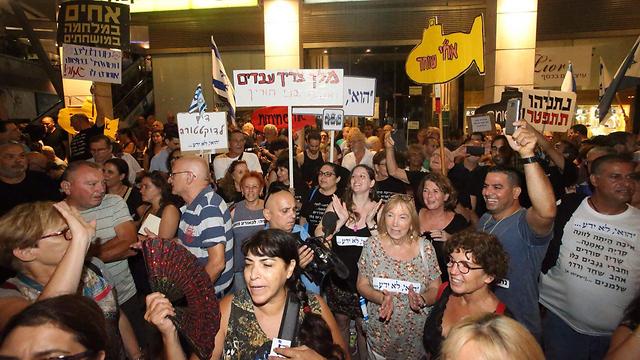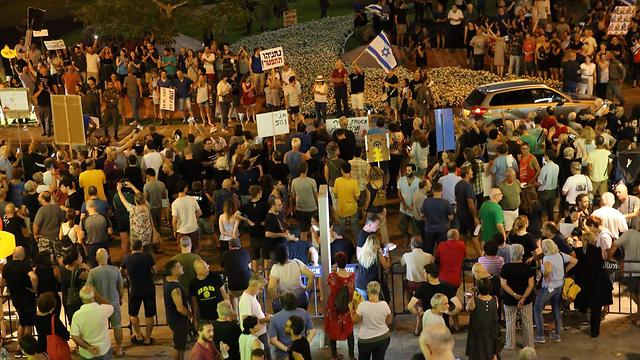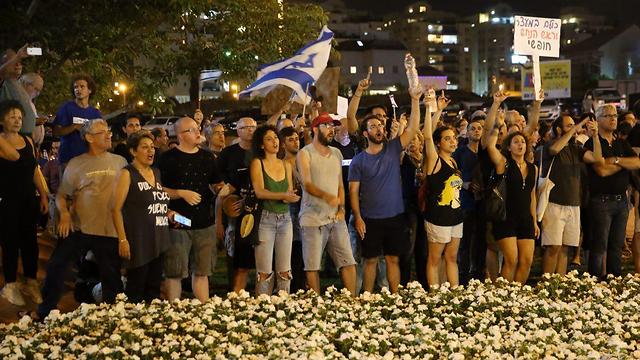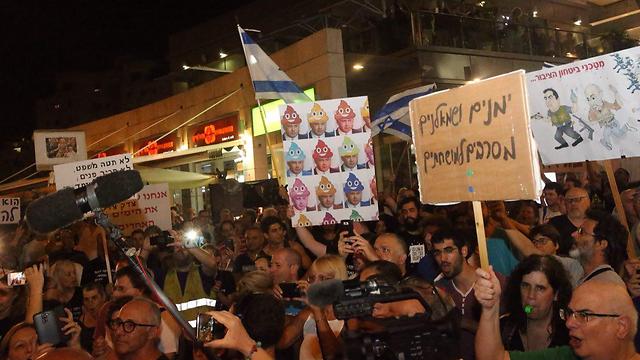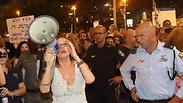
The protesters were carrying signs that said, among other things: "A king needs slaves" and "Corrupt people, go home."
Police said the protesters were violating the terms set by the High Court. In addition to hundreds more people arriving to demonstrate than permitted, protesters were using more than two megaphones, spread out onto the road and began their demonstration at 7pm instead of 8pm.
Some 500 people were protesting in a fenced area allocated for the demonstration, and some 1,500 others have also arrived and were protesting outside the allocated area.
About 20 Likud supporters were holding a counter-protest.
Protest organizers rejected police accusations, saying 500 protesters were at the Goren Square, while the others were in a nearby area "in accordance with the law and the plan ordered by the High Court."
"The claim that the leaders of the protest are supposed to instruct people to remain at home is ridiculous, unreasonable, and mostly undemocratic," the organizers said in a statement.
"It is the right of thousands of citizens in a democratic country to arrive at the city center to protest," they went on to say, allowing that protesters "must obey police instructions on the exact location of the protest."
The protest organizers went on to argue it was the police's job to manage the crowds, directing people to Goren Square and to additional areas outside of it.
What began as a gathering of a handful of good governance activists outside the home has now, in its 40th week, swelled into a powerful display of flag-waving Israelis each Saturday night that has drawn heavy media coverage, sparked counter pro-Netanyahu protests and unnerved police.
The High Court of Justice issued a temporary injunction on Thursday allowing up to 500 protesters to continue demonstrating at Gorden Square in Petah Tikva without needing special police authorization until a decision is made on a petition by the Movement for Quality Government in Israel, which appeals police decision to bar them from the square.
"The neighbors' right for quiet doesn't come close to the right for the freedom of expression and the right to demonstrate," Judge Yoram Danziger said during Thursday's hearing, noting that on a grander scheme, the right for quiet is lower on the scale than the freedom of expression.
A resident of the Kfar Ganim neighborhood in Petah Tikva recently filed a petition to the High Court against the police over the noise caused by the thousands of people who arrive to Goren Square in the neighborhood every Saturday night to protest.
In response to the petition, the police informed protest organizers they would no longer allow demonstrations to be held without a permit, and then refused to give a permit for more than 50 people to demonstrate at Goren Square.
Protestors tried arriving at the square last week despite police blockages and closures, later congregating in the alterative location the police had approved. Two of the protesters' organizers, attorney Eldad Yaniv and former PMO chief caretaker Meni Naftali, were detained for questioning on the night of the protest.
Yaniv and Naftali were released from police custody on Sunday after reaching an agreement with the police: The two agreed not call on demonstrators to attend an illegal protest until the following Sunday, and in return they were released without bail or restrictions.















